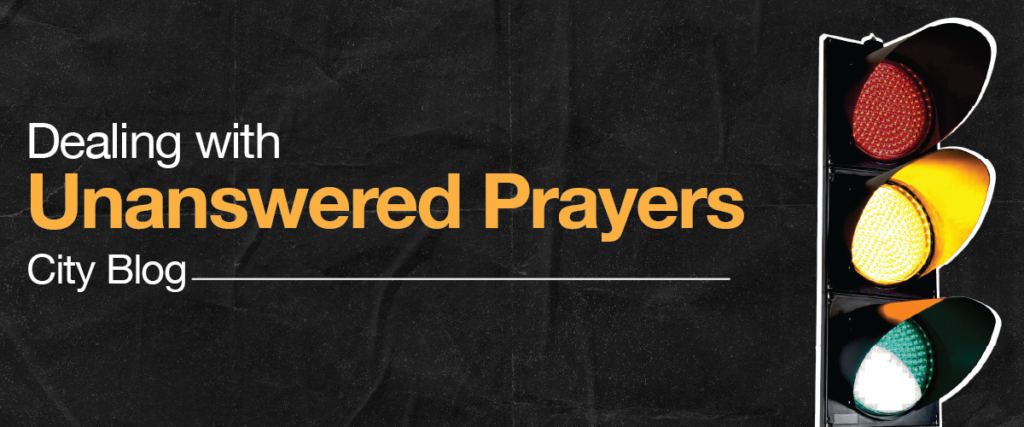
I grew up going to Sunday school and remember singing along with friends, many songs that wittily compressed big Bible truths into child-friendly jingles. One of those songs etched in our little minds the value of every prayer offered to God, however childlike it seemed. Without a care in the world and with childlike gusto, we often sang:
“Sometimes God answers “Yes” when I pray; Sometimes God answers “No” when I pray; Sometimes God answers “Wait”, just because He loves me so, but I know He always answers when I pray.”
We would clap and gesture with our hands, mimicking the traffic light signals of Red (STOP), Amber (GET READY) and Green (GO), each signal corresponding to God’s response to our prayers with a ‘NO’, ‘WAIT’ or ‘YES’, respectively. While this rendition made for a fun kids’ Sunday school song, its message rings true for both young and old. However, I have since learnt that a ‘No’ or ‘Wait’ response is easier sung than embraced as a lived experience.
Where do broken hearts go?
Waiting (for just about anything) can be hard! From that long overdue promotion at work to the excruciating disappointment of yet another negative pregnancy test result, we lament ‘How long, O Lord?’ Rightly do we give voice to our frustrations and disappointments. But to whom do we direct those poignant words and sighs? Or as a famous singer rhetorically asks, “Where do broken hearts go?”
From the viewpoint of an increasingly secular culture, there is no shortage of answers to that vital question, many of which though offer temporary relief, underdeliver in the long run. These secular band-aids rarely offer lasting solutions or real hope. Instead, they often lead to an endless cycle of hopes raised and dashed, raised again only to be dashed yet again.
Not so the Christian hope! Hinged on the work and person of Christ, a man of sorrows and acquainted with grief, the Christian hope offers more than mere placebo effect. This hope sustains the soul through seasons of drought and ushers believers into the arms of a loving Father who sees, listens and acts.
Motivated to pray
Throughout the Bible, we read of men and women pouring out their hearts before God, some from desperation and anguish, others from hearts overflowing with joy and thanksgiving. The Prophet Habakkuk, one of the minor prophets in the Old Testament, exemplifies one of such brutally honest dialogues with God. Not once, but twice did he lament the wickedness and injustice of his day, charging God with silence and indifference. God graciously welcomed his questions:
“How long, Lord, must I call for help, but you do not listen? Or cry out to you, “Violence!” but you do not save? Why do you make me look at injustice? Why do you tolerate wrongdoing? Destruction and violence are before me; there is strife, and conflict abounds.” – Habakkuk 1:2-3.
And God answered:
“Look among the nations and see; wonder and be astounded. For I am doing a work in your days that you would not believe if told.” – Habakkuk 1: 5
The same is true of our day, that while God may seem silent and distant, or even removed from our personal circumstances, He is working behind the scenes as He was in Habakkuk’s day. This truth ought to fuel our continuous prayers, all the while waiting and trusting with heart and mind stationed on God. We must remember that our prayers don’t necessarily guarantee a desired outcome, rather they show our dependence on God and trust in Him to do what is best. Also, through the waiting process, God works in us to refine our desires and align them with His priorities. All through history, He has proven himself to be a God on whom we can wait with confidence, with the assurance that our waiting is never in vain.
Habakkuk had some difficult questions and knew just where to go with them. Just as God welcomed the prophet’s questions, so does He welcome ours. Our questions and frustrations need not trip us up on our journey of faith, they instead ought to drive us towards God and not away from Him. In our questioning and lamenting though, we must maintain an attitude of submission and reverence, acknowledging that we come to God on His terms, not ours.
Habakkuk confidently waited on God for His mercy, judgement, and salvation. We too can journey from frustration to faith with confidence in the same God, by taking a stand at our watch-post and waiting to see what He will say. God’s word must be a constant companion in our waiting, as the Spirit of God works through His word to remind us of His many promises and aid us in our waiting. Reflect on God’s previous acts of mercy you’ve experienced and let those encourage you. Also, seek out brothers and sisters in the body of Christ whose testimonies can encourage and strengthen your faith.
So, have you prayed about it (whatever ‘it’ is)? Trust God, do the next thing, and don’t stop praying. As this quote aptly reminds us:
“You can do more than pray after you have prayed, but you cannot do more than pray until you have prayed.”
Sike Osinuga is a Christian woman learning the ropes of being a godly wife and mother, one wobbly step at a time. An erstwhile Telecoms Engineer, she enjoys reading good books and writing. Her passion is to know Christ and to make Him known. She blogs at thrivebytheword.com.
